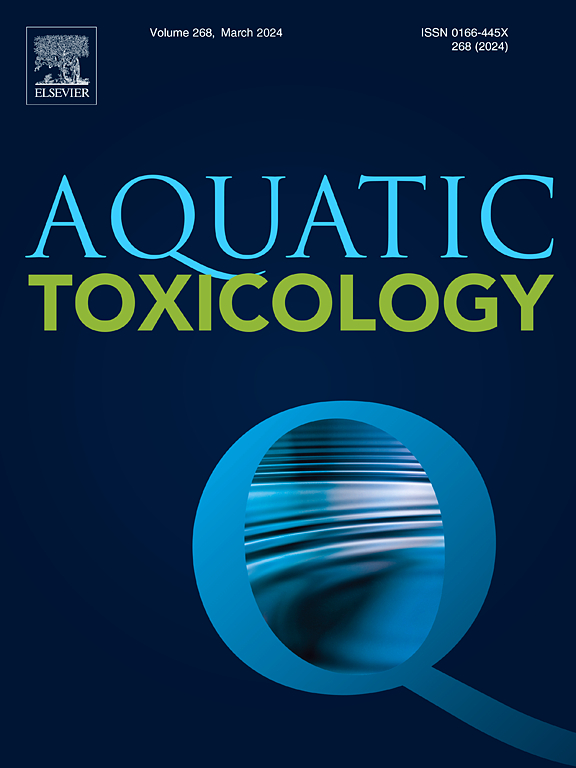溴敌隆亚致死暴露诱导成年斑马鱼呼吸异常和肠道微生物群失调
IF 4.3
2区 环境科学与生态学
Q1 MARINE & FRESHWATER BIOLOGY
引用次数: 0
摘要
Boscalid (BO)是水环境中常见的琥珀酸脱氢酶抑制剂杀菌剂之一,对水生生物的呼吸功能和肠道健康的影响尚不清楚。因此,本研究将斑马鱼暴露于0.01-1.0 mg/L的BO溶液中21天,以评估其对斑马鱼呼吸和肠道微生物群的影响。结果表明,暴露于0.1和1.0 mg/L BO 21天后,斑马鱼表现出鳃丝聚集,黏液细胞减少,眼球运动明显减少,呼吸链复合物II活性明显下降。16S rRNA基因测序结果显示,1.0 mg/L BO对斑马鱼肠道菌群组成有显著影响。具体而言,斑马鱼体内与能量代谢和免疫途径相关的有益菌(鲸杆菌)的相对丰度显著降低,而致病菌(如Ralstonia、Legionella、不动杆菌、Escherichia/Shigella)的相对丰度则显著增加。因此,宏基因组功能预测分析进一步揭示了bo诱导的肠道菌群变化对斑马鱼能量代谢和免疫途径的潜在影响。此外,肠组织的组织病理学分析显示,接触BO导致上皮细胞坏死和脱落,以及杯状细胞计数减少,从而加剧了对肠道健康的不良影响。综上所述,亚致死暴露于BO会影响斑马鱼的呼吸功能和肠道健康。因此,水生环境中BO对鱼类健康的影响值得关注。本文章由计算机程序翻译,如有差异,请以英文原文为准。

Sublethal exposure to boscalid induced respiratory abnormalities and gut microbiota dysbiosis in adult zebrafish
Boscalid (BO), one of the frequently detected fungicides of succinate dehydrogenase inhibitor in water environments, has unknown effects on the respiratory function and gut health of aquatic organisms. Therefore, zebrafish were exposed to BO solutions (0.01–1.0 mg/L) for 21 days to assess its effects on zebrafish respiration and intestinal microbiota in this study. The results showed that exposure to 0.1 and 1.0 mg/L BO for 21 days resulted in zebrafish exhibiting aggregation of gill filaments, reduction of mucous cells, and significantly decreased opercular movement, linked to a marked decline in the activity of respiratory chain complex II. 16S rRNA gene sequencing revealed significant changes in the intestinal microbiota composition of zebrafish exposed to 1.0 mg/L BO. Specifically, the relative abundance of beneficial bacteria (Cetobacterium) was markedly reduced, while pathogenic bacteria (such as Ralstonia, Legionella, Acinetobacter, Escherichia/Shigella) associated with energy metabolism and immune pathways in zebrafish showed a significant increase in relative abundance. Accordingly, metagenomic functional prediction analysis further revealed the potential impact of BO-induced gut microbiota changes on energy metabolism and immune pathways in zebrafish. Furthermore, histopathological analysis of intestinal tissues revealed that exposure to BO resulted in necrosis and shedding of epithelial cells, as well as a decrease in goblet cell count, which exacerbated adverse effects on intestinal health. In conclusion, sublethal exposure to BO affects the respiratory function and intestinal health of zebrafish. Therefore, the impact of BO in aquatic environments on fish health warrants attention.
求助全文
通过发布文献求助,成功后即可免费获取论文全文。
去求助
来源期刊

Aquatic Toxicology
环境科学-毒理学
CiteScore
7.10
自引率
4.40%
发文量
250
审稿时长
56 days
期刊介绍:
Aquatic Toxicology publishes significant contributions that increase the understanding of the impact of harmful substances (including natural and synthetic chemicals) on aquatic organisms and ecosystems.
Aquatic Toxicology considers both laboratory and field studies with a focus on marine/ freshwater environments. We strive to attract high quality original scientific papers, critical reviews and expert opinion papers in the following areas: Effects of harmful substances on molecular, cellular, sub-organismal, organismal, population, community, and ecosystem level; Toxic Mechanisms; Genetic disturbances, transgenerational effects, behavioral and adaptive responses; Impacts of harmful substances on structure, function of and services provided by aquatic ecosystems; Mixture toxicity assessment; Statistical approaches to predict exposure to and hazards of contaminants
The journal also considers manuscripts in other areas, such as the development of innovative concepts, approaches, and methodologies, which promote the wider application of toxicological datasets to the protection of aquatic environments and inform ecological risk assessments and decision making by relevant authorities.
 求助内容:
求助内容: 应助结果提醒方式:
应助结果提醒方式:


